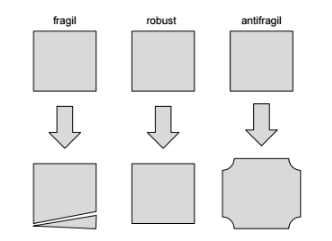Things that gain from disorder
If you stumble over crypto-currencies, you will soon stumble over peer-to-peer networks and you will then stumble over a term called antifragility.
Yet, what exactly is antifragility? And why are decentralized systems rather antifragile than centralized ones?
The term Antifragile was introduced by Nassim Nicholas Taleb in his book: Antifragile: Things That Gain from Disorder. Actually, Antifragility is quite simple, it is the opposite of fragility.

As you can see in the picture, as soon as pressure is applied to a system, a fragile system breaks. A robust system is able to withstand outside pressure and more or less stays the system after outside pressure has been applied. An antifragile system yet is gaining from pressure and will not just recover, but even become stronger than it was before. To push this further, antifragile systems gain from pressure (or disorder) - if none is applied they might soon turn into fragile systems.
Muscles and Antifragility

The best real-life example of an antifragile system is the muscular system of our body. If we do not use it, it becomes more and more fragile - which is not the worst, since muscles need energy and the body can save that energy if we do not use our muscles. Yet it becomes fragile.
If a person not used to start doing sports suddenly starts running, he or she will need a long time to to adapt to the new tasks. A trained cyclist will have less problems when switching to running.
That is by the way another feature of antifragile systems. They are adaptive and able to react to environmental changes very fast. Therefore yet they need a lot of pressure to stay adaptive.
centralized vs decentralized systems
When it comes to centralized systems, this looks differently. With one central database overwatched by one system admin, you have a very fragile system. Security measures like firewalls make it more robust, but ultimately organizations try to add more decentralization by having several database servers with redundant data and several admins sharing responsibilities.
Decentralized systems are still very different from that. They do not have a head - in form of several system administrators or whatsoever. Look at the Blockchain. Nobody has direct control over it. Also, if one node is down, it doesn't affect the system. Even when 95% of the nodes get taken down, it will still work. A higher participation and therefore a higher pressure to the system makes it even more decentralized and more antifragile.
The next post will be about The DAO - I will explain why was it a fragile system - and will invite you to discuss possibilities for an antifragile DAO
I came across the concept of Anti-fragility two months ago and am now reading Taleb's Black Swan. I like the concept a lot and certainly see parallels between the concept of Anti-fragility and decentralized systems. I like to compare Anti-fragility with a porcelain cup. If we drop it, it will break. Most people would think that in order to keep it from breaking, we should make the cup harder which is like making it more 'Resilient' or unchanging in volatile circumstances. However, what if we would not harden the material of the cup, but would change its structure so that everytime it would break it would grow and get stronger from volatility. That is 'Anti-fragility'.
Downvoting a post can decrease pending rewards and make it less visible. Common reasons:
Submit
I stumbled accross a draft of the starfish and the spider https://www.amazon.de/dp/B000S1LU3M/ref=dp-kindle-redirect?_encoding=UTF8&btkr=1
which motivated me to write this blog. Starfishes have the great ability that they do not have a head - apparently every leg (or how is it called?) is kind of an independent entity, and some species are even able to recover themselves from just a leg.
Still I'm not sure if a starfish is a good example for antifragility, since it just recovers from pressure, it does not gain strength.
Great examples are hard to find, but it is fun to search them :)
Anyways, thanks for recommending the black swan to me
Downvoting a post can decrease pending rewards and make it less visible. Common reasons:
Submit
Upvoted you
Downvoting a post can decrease pending rewards and make it less visible. Common reasons:
Submit